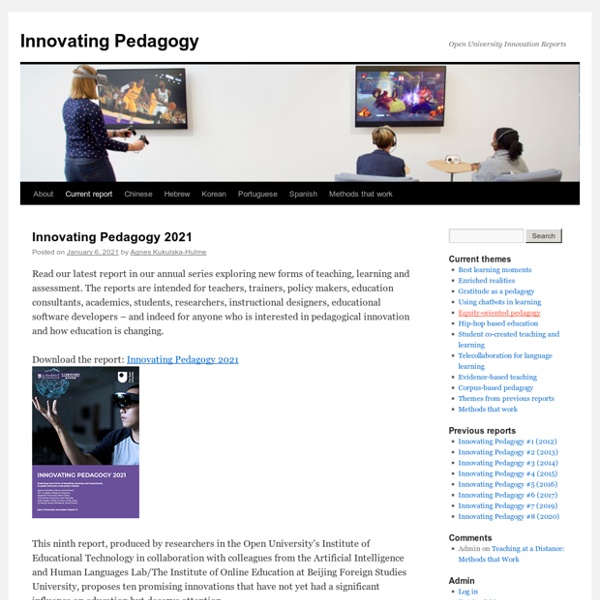7 Things You Should Know About the HyFlex Course Model
HyFlex is a course design model that presents the components of hybrid learning in a flexible course structure that gives students the option of attending sessions in the classroom, participating online, or doing both. Students can change their mode of attendance weekly or by topic, according to need or preference. Models like HyFlex, which present multiple paths through course content, may work well for courses where students arrive with varying levels of expertise or background in the subject matter.
UDL: Downloads
Each of these representations has a particular goal and traces our learning not only as an organization but as a field more broadly. Version 2.2 (2018) we see this version as yet another representation to more fully explore and articulate the promise of UDL. About the Graphic OrganizerFAQ
Teaching about mental wellbeing
This training module supports the physical health and mental wellbeing section of the statutory relationships, sex and health education curriculum. This is the first of a series of 14 modules to support schools to implement the new curriculum. We have developed this mental wellbeing teacher training module to help subject leads and teachers understand what they should teach, as well as improving their confidence in delivering mental wellbeing as part of the new curriculum. The new curriculum becomes statutory in September 2020 but the content in this module may be useful for teachers who are currently working with pupils, either face-to-face or remotely, to support them to maintain good mental health and address issues before they escalate. How to use this training module
50+ Tools for Differentiating Instruction Through Social Media
Imagine a world where resources were limited to what was found in the classroom or the school closet known as the "Curriculum Materials Room." Picture a world where students wrote letters with pen and paper to communicate with other students and adults outside of the building. Due to postage costs, the teacher either sent the letters in bulk or paid for stamps out of his or her own pocket. Can you recall a time when student interests like skateboarding or video were never used as part of learning curriculum because the tools needed were either too expensive or not yet conceptualized? Do you remember a time when non-traditional learners struggled, and absenteeism meant a high likelihood of students doing poorly in school, and possibly having to retake the course? If you experienced none of these scenarios, then you live in a world of possibility because you grew up with the many social media tools available to support all learners.
Unit 1: Teach Narrative Writing With The New York Times
Welcome to our first writing unit of the school year. Below you’ll find a detailed description of each element, as well as ways to put them together to make your own custom writing unit. To learn more about other writing units, visit our writing curriculum overview. Stories can thrill, wound, delight, uplift and teach. Telling a story vividly and powerfully is a vital skill that is deeply valued across all cultures, past and present — and narrative writing is, of course, a key genre for literacy instruction at every level. When your students think “New York Times,” they probably think of our 168-year history of award-winning journalism, and may not even realize that The Times today is full of personal narratives — on love and family, but also on how we relate to animals, live with disabilities or navigate anxiety.
Google Chrome’s Link to Text Fragment extension – Top Tools for Learning
A recent article in MakeUseOf, You can now link to specific text on a website explains “If you have ever wanted to share an article with someone but direct them to a specific part, you’ll love Google’s new Chrome extension. It’s called Link to Text Fragment, and it allows you to link to specific text on a website. Or, as Google calls it, a Text Fragment.”
All Sites
Stack Overflow Stack Overflow Q&A for professional and enthusiast programmers Server Fault
Sites everyone should know about - Educating Holmes
*Everybody* knows about great sites like Times Table Rockstars, Spelling Shed and Read Theory. We *all* know about White Rose & the NCETM, the Literacy Shed and Testbase. And if you haven’t checked out No More Marking yet, then I recommend you bookmark this post, go check it out and come back to read this post later.
"Catch-up" and recovery approaches: Selected reading
Introduction There is understandably huge concern about the learning that many pupils will have missed whilst unable to attend schools face-to-face due to the COVID-19 outbreak – both due to learning time they may have missed, and due to a possible extended ‘summer learning loss’ effect where learning prior to the lockdown may have been forgotten. There is also, rightly, concern about the impact of pupils from a socio-emotional perspective. A number of proposals have been made about how schools (and other organisations) may seek to support pupils during a recovery period as schools reopen more widely, and / or how pupils may be supported to “catch up” on lost learning.
Why a third of every lesson is retrieval practice
I still see and hear people talking about revision being at the end of course. Following lock-down learning I’ve seen people say that they need to have to time to revise with year 11 before the 2021 exams. I won’t. I will be teaching them up until their exam. In fact, when we went to lock-down learning, during a department discussion, one of our biggest concerns was not necessarily them not learning the new content, but them not having the usual retrieval practice.



